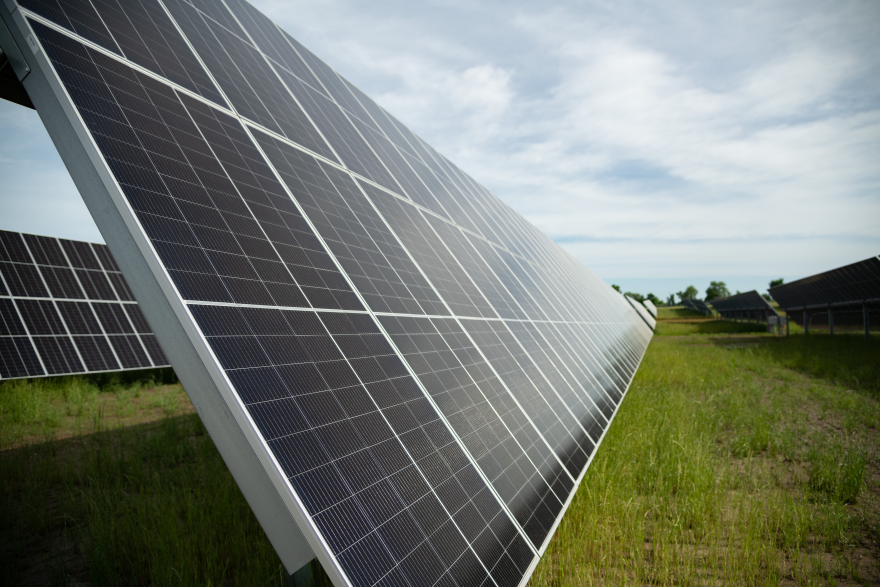Ameren Missouri aims to buy a solar power plant near Bowling Green, Missouri, that could produce energy by 2024.
The Huck Finn Solar Project would be Ameren’s largest solar facility. Ameren leaders expect the 200-megawatt plant to provide power for 40,000 homes.
The announcement comes days after the utility shared its updated 20-year plan with the Missouri Public Service Commission. It accelerates the company’s goal by five years to achieve net-zero carbon emissions by 2045 and increases its carbon emissions reductions to 60% by 2030.
“We have expanded the amount of renewable energy we expect to invest in by 2030, and also by 2035,” said Ajay Arora, chief renewable development officer for Ameren Missouri. “Huck Finn and another solar project that we have also acquired earlier this year are setting us on the path towards that reliable, affordable and resilient transition.”
Arora didn’t disclose how much Ameren will pay for the Bowling Green solar plant, but he expects the facility to create more than 250 construction jobs. Ameren’s planned acquisition would follow the utility’s purchase of a 150-megawatt solar facility earlier this year.
If state regulators approve the purchase soon, the facility can produce clean energy in two years, he said.
The solar plant is a necessary addition to Ameren’s portfolio, said Ashok Gupta, senior energy economist for the Natural Resources Defense Council.
“What you see mostly in the last 20 years around the country is a lot of wind and a lot of solar,” Gupta said. “Adding solar to the mix is very, very good because when solar electricity is generated tends to be on hot days and sunny days when we need a lot of electricity, and it complements wind that's in the system already.”
Gupta expects more solar and wind investments from Ameren over the next five years.
Ameren’s plan includes the company’s proposal to build a natural gas-powered plant within 10 years.
That plant would help ensure a reliable energy supply as Ameren shifts to renewable energy, Arora said.
“In addition, we are retiring several of our gas-fired peaking plants in Illinois earlier because of Illinois legislation, then it's important that in order to integrate renewables, which really are the focus of our transition, but in order to reliably integrate renewables, we need a gas-fired plant,” he said.
Utility officials said the gas plant could use hydrogen and future carbon capture technologies. Arora said the plant is needed as Ameren closes its coal plants, including its Sioux Energy Center in Alton, though the utility pushed back its closure two years to 2030.
Environmentalists said the company should focus on renewable energy projects.
“We need to be totally decarbonized by 2035, and they're going to build a new fossil plant in 2030, or 2031,” said Jenn DeRose, campaign representative for the Missouri Sierra Club’s Beyond Coal campaign. “It's just completely unhelpful, especially when there are other alternatives that make a lot of sense.”
DeRose also worried that higher gas prices would make a gas-powered plant economically risky and that the utility should continue to invest in more renewable energy.
“When we're talking about the economics of it, at least the economic viability of this is not great for ratepayers,” DeRose said.
Ameren announced it would close its Rush Island coal plant by spring 2024, 15 years ahead of its original date. Last year, a federal appeals court upheld a 2017 court decision that Ameren violated the federal Clean Air Act by installing equipment that raised sulfur dioxide emissions. A federal judge ruled that Ameren should have installed pollution control equipment at the plant.
But Gupta said that state regulators may not approve the gas plant and that Ameren could make significant changes to its plan over the next five years.
“The natural gas plant is in there in my view as a placeholder, and different factors will determine exactly what happens when it happens, whether it'll be delayed or not,” he said. “Given the fact that Rush Island is closing, a lot more energy efficiency is now cost effective. And the company could easily be doubling or tripling its energy efficiency program to further delay the natural gas plant.”
Gupta said a lot can change over the next few years to cause Ameren to not need the gas plant, especially as battery storage technologies develop and energy efficient technologies come down in price and as the cost of natural gas continues to fluctuate. But he said investors also have a say, and they may be more interested in renewable energy.
“One could clearly argue that the reason to do it is for reliability, but the question is really at what cost and are there other alternatives that are cheaper and better and less risky,” Gupta said.
Follow Chad on Twitter: @iamcdavis



